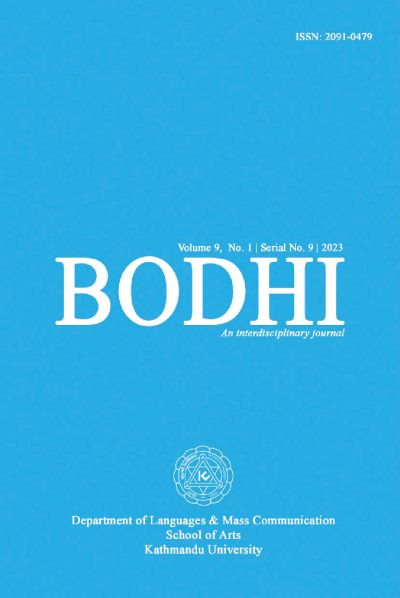Bodhi: An Interdisciplinary Journal
Abstract
The present volume of Bodhi includes a textual analysis of a novel from India's northeast from a feminist perspective; an examination of media literacy among school headteachers in Kathmandu Valley; an economic model that helps the media sustain itself without crossing its ethical boundaries; an examination of a canonical text of economics from the communication perspective; and a critique of contemporary media practices amid Nepal's clientalist political structure.
The volume also contains interventions in the field of education, with an analysis of teacher educators' perceptions and experiences in professional development; secondary level teachers' professional development through research and development; new pedagogical approaches in the digital realm in a post-pandemic world; a phenomenological inquiry into the importance of emotional intelligence in faculty retention in educational institutions in Nepal; an exploration of academic leadership embedded in the Vedic teaching-learning practices in the Indian subcontinent; and a proposal for a posthuman pedagogy that incorporates human and non-human realities that promotes lifelong learning procedures. Finally, the volume includes interventions in the social sciences, with an analysis of internal migration and citizenship regulations for Nepalis as they straddle administrative boundaries; a study of Dalit women's political participation in the eastern Nepali city of Biratnagar; a deep dive into the adoption of mobile phone-based agriculture application among smallholder farmers in a municipality in Kathmandu district; and an analysis of the role of women in the 1971 non-cooperation movement across East Pakistan against the oppressive Pakistani government. We believe that this volume serves as indispensable material in the advance of debates in the thematic areas and disciplines they cover.
We sincerely thank our contributors for trusting us with their articles and the reviewers for the timely review of the articles. When the next iteration of this journal reaches the tenth volume's landmark, we aim to make it even more special. Therefore, we invite academics and researchers across various fields in the Humanities and Social Sciences to contribute their articles to make Bodhi's next volume another leading light in our inter/multidisciplinary and transnational academic intervention.
Downloads
Published
How to Cite
Issue
Section
License
© Department of Languages and Mass Communication, School of Arts, Kathmandu University, Nepal




